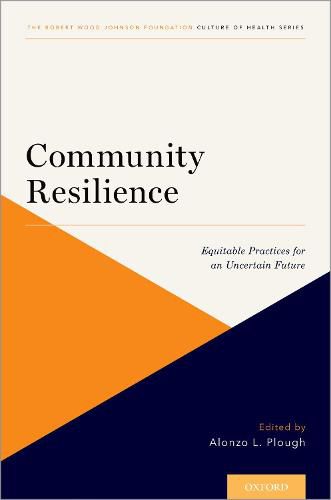Readings Newsletter
Become a Readings Member to make your shopping experience even easier.
Sign in or sign up for free!
You’re not far away from qualifying for FREE standard shipping within Australia
You’ve qualified for FREE standard shipping within Australia
The cart is loading…






In this fifth volume of the Robert Wood Johnson Foundation’s Culture of Health series, Community Resilience: Equitable Practices for an Uncertain Future highlights the importance of resilience, or the set of assets that allow a person or place to recover when adversity hits, by illustrating the policies and stories of lived experience surrounding health equity. Whether that adversity is acute–such as an environmental disaster or an abuse of police power–or chronic–such as that engendered by poverty and racism–local innovation and community engagement are key to nurturing resilience and promoting health equity.Community Resilience positions storytelling and narrative shifts as essential to influencing our perceptions of who deserves empathy or support, and who does not, by examining the systemic barriers to resilience and the opportunities to reshape the landscape to overcome those barriers. The central message of this volume–across immigration or imprisonment, opioids or trauma, housing or disaster preparedness–is that we must act intentionally and allow a shift in power in order to make progress.
$9.00 standard shipping within Australia
FREE standard shipping within Australia for orders over $100.00
Express & International shipping calculated at checkout
In this fifth volume of the Robert Wood Johnson Foundation’s Culture of Health series, Community Resilience: Equitable Practices for an Uncertain Future highlights the importance of resilience, or the set of assets that allow a person or place to recover when adversity hits, by illustrating the policies and stories of lived experience surrounding health equity. Whether that adversity is acute–such as an environmental disaster or an abuse of police power–or chronic–such as that engendered by poverty and racism–local innovation and community engagement are key to nurturing resilience and promoting health equity.Community Resilience positions storytelling and narrative shifts as essential to influencing our perceptions of who deserves empathy or support, and who does not, by examining the systemic barriers to resilience and the opportunities to reshape the landscape to overcome those barriers. The central message of this volume–across immigration or imprisonment, opioids or trauma, housing or disaster preparedness–is that we must act intentionally and allow a shift in power in order to make progress.